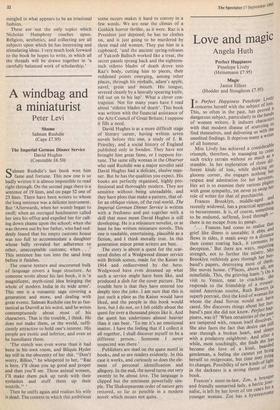A windbag and a miniaturist
Peter Levi
Shame Salman Rushdie (Cape £7.95) The Imperial German Dinner Service David Hughes (Constable £6.50)
SSalman Rushdie's last book won him fame and fortune. This new one is so badly written it is almost impossible to read right through. On the second page there is a sentence of 19 lines, and on page 52 one of 23 lines. There have been writers to whom the long sentence was a delicate instrument. But 'Afterwards, when her womb began to swell; when an outraged headmaster called her into his office and expelled her for call- ing down shame upon the school; when she was thrown out by her father, who had sud- denly found that his empty customs house was too full to accommodate a daughter whose belly revealed her adherence to other, unacceptable customs; when . . This sentence has run into the sand long before it finishes.
The coarse texture and uncorseted bulk of language covers a huge structure. As someone wrote about his last book, it is 'a magnificent, myth-sized idea bringing the whole of modern India in its wide arms'. This one is a romantic saga covering a generation and more, and dealing with great events. Salman Rushdie can be as fan- tastical as Durrell at his worst, and he writes contemptuously about most of his characters. That is the trouble, I think. He does not make them, or the world, suffi- ciently attractive to hold one's interest. His people are exotic and inferior, and even so he humiliates them.
'The stench was even worse than it had been in his own room, and Bilquis Hyder lay still in the obscenity of her shit. "Don't worry, Billoo," he whispered to her, "Raz is here. I'll clean you up good and proper and then you'll see. Those animal women, I'll make them pick up turds with their eyelashes and stuff them up their nostrils." '
Then he sniffs again and realises his wife is dead. The context in which this ambitious
scene occurs makes it hard to convey in a few words. We are near the climax of a Gothick horror thriller, as it were. Raz is a President just deposed; he has no clothes on, and is just going to be murdered by three mad old women. They put him in a cupboard, 'and the ancient spring-releases of Yakoob Balloch worked like a treat, the secret panels sprang back and the eighteen- inch stiletto blades of death drove into Raz's body, cutting him to pieces, their reddened points emerging, among other places, through his eyeballs, adam's apple, navel, groin and mouth. His tongue, severed cleanly by a laterally spearing knife, fell out on to his lap'. What a clever con- traption. Not for many years have I read about 'stiletto blades of death'. This book was written with the financial assistance of the Arts Council of Great Britain; I suppose it fills a need.
David Hughes is at a more difficult stage of literary career, having written seven novels before this one, a study of J. B. Priestley, and a social history of England published only in Sweden. They have not brought him great fame, or I suppose for- tune. The same silly woman in the Observer who said Rushdie was a major novelist said David Hughes had a delicate, elusive man- ner. But he has the qualities you expect. His books are perfectly organised, highly pro- fessional and thoroughly modern. They are sensitive without being unreadable, and they have plots that make a pattern, that of- fer an oblique vision, of the real world. The Imperial German Dinner Service is written with a freshness and put together with a skill that must mean David Hughes is still developing. He is a miniature novelist, or at least he has written miniature novels. This one is readable, entertaining, plausible as a fiction, and I think morally true. In this generation minor prose writers are best.
The story is about a quest for the scat- tered dishes of a Wedgwood dinner service with British scenes, made for the Kaiser in 1914 and rediscovered by the hero. Wedgwood have even dreamed up what such a service might have been like, and produced a dish for the cover picture. The trouble here is that they have entered too deeply into the joke. I am sure that this is just such a plate as the Kaiser would have liked, and the people in this book would love, but.I do not, so I felt coldly about the quest for over a thousand pieces like it. And the quest has undertones almost heavier than it can bear. 'To me it's an emotional matter. I have the feeling that if I collect it all together, I shall discover myself to be a different person. Someone I never suspected was there.'
Publishers are mad on the quest motif in books, and so are readers evidently. In this case it works, and curiously so does the ele- ment of personal identification and allegory. In the end, the novel turns out very sweetly to be about love. The language is clipped but the sentiment powerfully sim- ple. The Shakespearean order of nature gets restored, so far as possible in a modern novel: which means not quite.






































 Previous page
Previous page